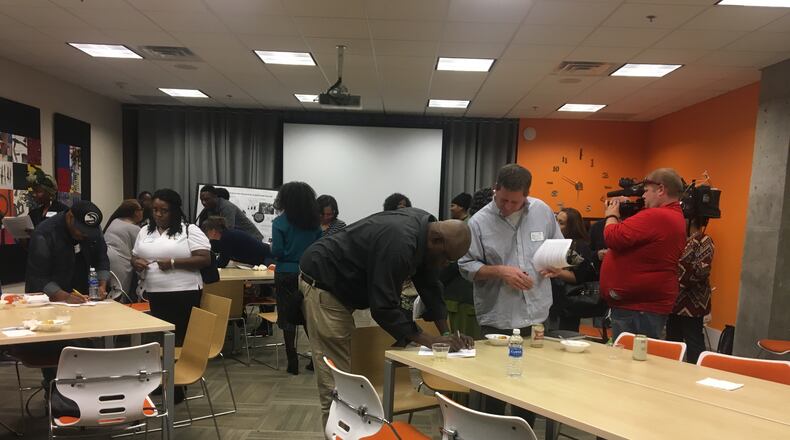The half dozen or so white people who showed up to the first-ever “Come Meet a Black Person” mixer Thursday had, in fact, met a black person before.
“I cheated coming here. I do have some black friends,” said Niall Mathieson, a white Barnesville retiree who drove nearly 90 miles to the event because he was interested in bringing the concept to his community. “We meet every morning at McDonald’s and talk about things.”
READ: 2 Chainz to perform at Georgia Swarm lacrosse game
The event, run by Lawrenceville arts group Urban Media Makers, welcomed a group that was about a quarter white and three-quarters black to get to know each other at a downtown coworking space Thursday night. Guests participated in a “cultural scavenger hunt,” talking to each other to find out who had done things like march in a Martin Luther King, Jr. Day parade or who had family that had immigrated to the U.S. through Ellis Island.
For two hours Thursday night, the small group chatted over cornbread and chilli long after completing their scavenger hunt sheets. With wide eyes and a big smile, organizer Cheryle Moses looked at the group and felt that it was a success.
“They’re so engaged,” she said.
Moses was planning a 16th anniversary event for her group, Urban Media Makers, when she stumbled upon a study that said the average white American’s social circle was 91 percent white, and the average African American’s social circle was 83 percent black. The numbers surprised her, and she was moved to use her group’s anniversary as an opportunity to try and chip away at those statistics.
“My spirit said, ‘Call it Come Meet a Black Person,’ ” Moses said. “I wrote the description as it came to me and went to sleep,” Moses said. “I woke up the next morning and [the response] was crazy."
Moses was flooded with Facebook comments and emails.
In the week before the event, some people were outraged by the name or concept, Moses said. One woman was so disturbed when she heard about the event, she called “screaming,” Moses said. The woman on the phone was white, but said she had black family members and worked at a company whose employees were 80 percent black. The woman, her family and her coworkers were all upset about the event, Moses said.
“You could feel her anger. She wanted to come through the phone and choke my neck,” Moses said.
Moses asked the woman if she had read the invitation, and the woman said she had only read the first four lines.
“I started explaining to her and you could feel her relaxing through the phone,” Moses said.
One guest at the event was still skeptical of the concept, but Moses said Friday morning that she’d already received an email from him asking about future events.
Moses, a black woman, said she’s dealt with racism all her life, but that it has been “just blatant” recently, making her feel obligated to do something to combat the problem. She said she’s had white people touch her blonde dreadlocks in the grocery store without asking, something she said they wouldn’t do if they had a close black friend.
“How can you learn about a person if you’ve never had that person in your life?” Moses said.
Lisa Fields-Miller, a black woman from Lawrenceville, shared Moses’s shock when she read the study about racial boundaries in friendships.
“The statistics I read were unbelievable,” said Fields-Miller, who has had white friends all her life. “Who are these people? Are they living under a rock?”
At the end of the event, as participants took turns introducing themselves to the entire group, Mathieson said he was impressed with the event and hoped to replicate it back at his church in Barnesviille.
Mathieson said that if the attendees Thursday night went home and did nothing, the impact would be small. But if they continued the effort, it could grow. “... they talk to 50 people, and those 50 people talk to 50 more people, you have a classic pyramid,” Mathieson said.
Like Gwinnett County News on Facebook | Follow us on Twitter and Instagram
About the Author
Keep Reading
The Latest
Featured
